Featured
 Activists Hope a New Voting Rights Bill Might Finally Overcome the Senate Filibuster. By Grace Segers / TNR
Activists Hope a New Voting Rights Bill Might Finally Overcome the Senate Filibuster. By Grace Segers / TNR
It’s been a trying few months for progressive activists hoping Congress would pass comprehensive voting rights legislation. Republicans torpedoed the For the People Act, a sweeping elections and ethics reform bill, and seem unwilling to support the John Lewis Voting Rights Advancement Act, which would restore a portion of the 1965 Voting Rights Act gutted by the Supreme Court.
But a development on Tuesday gave progressive activists reason to hope that Congress might actually take action amid nationwide efforts in Republican-led states to pass restrictive voting measures: the introduction of the Freedom to Vote Act. Read more
Related: Joe Manchin Got the Voting Bill He Wanted. Time to Pass It. By The Editorial Board / NYT
Related: North Carolina Judges Strike Down State’s Voter ID Law. By Gary D. Robertson / HuffPost
Related: Georgia Is How American Democracy Falls Apart. By Trevis Waldron / HuffPost
Political / Social
 Raphael Warnock, the freshman senator not playing it safe. By Perry Bacon Jr. / Wash Post
Raphael Warnock, the freshman senator not playing it safe. By Perry Bacon Jr. / Wash Post
First-year senators typically don’t make many waves. Senators from swing states also tend toward the circumspect, particularly when up for reelection. Black politicians who represent large numbers of White voters often shy away from issues related to race.
Georgia’s Raphael G. Warnock (D) is breaking all the rules. Warnock won by just two percentage points in January’s special election to replace the retired Johnny Isakson (R), and must win again in November 2022 to secure a full six-year term. But instead of playing it safe, Warnock has injected himself fully into the contentious fight over our voting laws, making passing national voting rights legislation a central cause of his first year in office. Read more
 Elise Stefanik’s ‘Hateful Rhetoric’ Ripped In Stinging Editorial By Hometown Newspaper. By Lee Moran / HuffPost
Elise Stefanik’s ‘Hateful Rhetoric’ Ripped In Stinging Editorial By Hometown Newspaper. By Lee Moran / HuffPost
Rep. Elise Stefanik’s (R-N.Y.) hometown newspaper offered a scathing response to her anti-immigrant rhetoric in a recent ad campaign. Stefanik, a Donald Trump loyalist, echoed the racist “great replacement” theory in ads warning voters of a “permanent election insurrection.” The conspiracy, which has been embraced by the far-right, posits that white people are being intentionally replaced by minorities and immigrants. In an editorial published Friday, the board of Albany’s Times Union newspaper critically asked with its title, “How Low, Ms. Stefanik?” “The idea of America as a melting pot is not some idealistic fiction of the left; it is part of the foundation of this nation’s greatness,” it wrote. Read more
 How Latinos are growing and reshaping the United States. By Suzanne Gamboa and Nicole Acevedo / NBC News
How Latinos are growing and reshaping the United States. By Suzanne Gamboa and Nicole Acevedo / NBC News
In New Hampshire, a Roman Catholic church where Irish and French Canadian immigrants used to worship now has the state’s largest Latino congregation. In the Deep South, a county in Georgia is one of the nation’s top 10 in diversity.
Hispanics accounted for over half of the nation’s population growth in the last decade. This is not just reflected in larger cities, but in mountain towns, Southern neighborhoods and Midwestern prairies.
“The Latino population has been dispersing across the United States for years — a reflection of where the nation’s population is moving and where opportunities are located,” said Mark Hugo Lopez, director of race and ethnicity research at the Pew Research Center. Read more
 Minnesota Supreme Court Allows The Ballot Question On Changing The Minneapolis Police. By AP and NPR
Minnesota Supreme Court Allows The Ballot Question On Changing The Minneapolis Police. By AP and NPR
The Minnesota Supreme Court cleared the way Thursday evening for voters in Minneapolis to decide on the future of policing in the city where George Floyd was killed, just ahead of the start of early and absentee voting.
The state’s highest court overturned a lower court ruling that rejected ballot language approved by the City Council. A district judge said the wording failed to adequately describe the effects of a proposed charter amendment that would replace the Minneapolis Police Department with a new Department of Public Safety that “could include” police officers “if necessary.” Read more
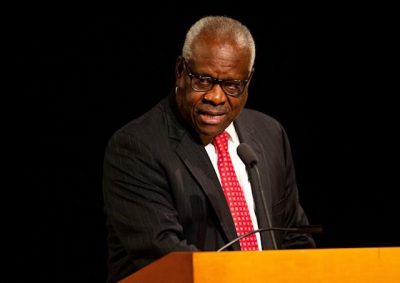 Supreme Court Justice Clarence Thomas delivers speech at Notre Dame. By Carlay Lanich / South Bend Tribune
Supreme Court Justice Clarence Thomas delivers speech at Notre Dame. By Carlay Lanich / South Bend Tribune
In a talk at the University of Notre Dame on Thursday, Supreme Court Justice Clarence Thomas showed his frustration with an increasingly divided America and lamented what he called a “race-obsessed world.”
The second Black justice on the Supreme Court made a rare public appearance at the university, following a year of social unrest, racial tension and politicization of classroom teachings. During the talk, he compared experiences in his youth to current events. Read more
 Larry Elder tried his own Big Lie. He did Democrats — and democracy — a favor. By Will Wilkinson / Wash Post
Larry Elder tried his own Big Lie. He did Democrats — and democracy — a favor. By Will Wilkinson / Wash Post
This week, Democratic California Gov. Gavin Newsom crushed the bid to oust him from office by a roughly 27-percentage-point, 2.5 million-vote margin, with around three-quarters of votes counted as of Wednesday. Unseating Newsom was unlikely. But that didn’t stop Republican Larry Elder — the hard-right radio personality who emerged as Newsom’s leading challenger — from trying to preemptively delegitimize the result with intimations of voter fraud. Read more
Related: Democrats Continue to Struggle With Men of Color. By Charles M. Blow / NYT
 Why the Culture Wars in Schools Are Getting Worse Than Ever Before. By Jonathan Zimmerman / Politico
Why the Culture Wars in Schools Are Getting Worse Than Ever Before. By Jonathan Zimmerman / Politico
In 1996, Christian Right leader Ralph Reed issued a statement that would become political scripture for religious conservatives. “I would rather have a thousand school board members than one president and no school board members,” Reed declared. By winning school elections, the theory went, conservatives would also win America’s battles over evolution instruction, sex education and school prayer.
Last May, former Donald Trump adviser Steve Bannon made a similar comment on his podcast. “The path to save the nation is very simple — it’s going to go through the school boards,” Bannon predicted. But Bannon pointed to a very different set of issues: critical race theory and the 1619 Project. He didn’t mention religion at all. Read more
Related: How To Teach Your Kids To Care About Other People. By Caroline Bologna / HuffPost
Related: Racism won’t die because of Black/white friendship. By Jason Johnson / Slate
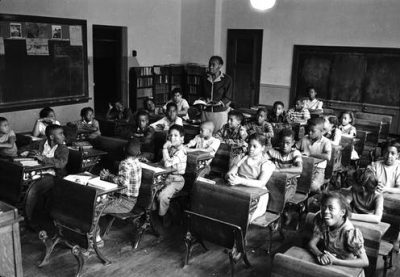 How reparations can be paid through school finance reform. By Preston Green III and Bruce Baker / The Conversation
How reparations can be paid through school finance reform. By Preston Green III and Bruce Baker / The Conversation
White public schools have always gotten more money than Black public schools. These funding disparities go back to the so-called “separate but equal” era – which was enshrined into the nation’s laws by the Supreme Court’s 1896 decision in Plessy v. Ferguson.
The disparities have persisted even after Brown v. Board of Education, the landmark 1954 Supreme Court decision that ordered the desegregation of America’s public schools.
Since Black schools get less funding even though Black homeowners pay higher property taxes than their white counterparts, we think reparations are due – and they can be paid by reforming the ways Black homeowners are taxed and schools in Black communities are funded. Read more
 Lawyers, race and money: Illinois’ messy weed experiment. By Shia Kapos / Politico
Lawyers, race and money: Illinois’ messy weed experiment. By Shia Kapos / Politico
Illinois stood to become a model for diversifying the marijuana industry in other states when it legalized the drug last year. So far, its success is half-baked.
As the first state Legislature to legalize recreational cannabis sales after others approved it by ballot measure, Illinois crafted what it hopes will be a national template for how to atone for the war on drugs while also generating new revenue.
It’s on pace to pull in $1.3 billion in weed sales this year, roughly double what it got in 2020, and thousands of marijuana-related criminal convictions have been wiped clean. But Illinois’ effort to diversify the lucrative industry away from established white-owned businesses has stumbled several times over the past two years. Shown is Gov. J. B. Pritzker who holds a bill that legalizes adult-use cannabis in the state of Illinois Tuesday, June 25, 2019, at Sankofa Cultural Arts and Business Center in Chicago Read more
 Urban heat islands in Atlanta highlight areas impacted by redlining. By Derek Van Dam and Haley Brink / CNN
Urban heat islands in Atlanta highlight areas impacted by redlining. By Derek Van Dam and Haley Brink / CNN
On a warm September afternoon, Mona Scott sat on the front porch while her home baked like an oven. As she ran a frozen water bottle across her forehead and arms, Scott told CNN her air conditioning broke 10 days earlier and had not yet been fixed.
 Kevin Merida Wants to Reinvent the ‘L.A. Times.’ By Joe Pompeo / Vanity Fair
Kevin Merida Wants to Reinvent the ‘L.A. Times.’ By Joe Pompeo / Vanity Fair
Enter Kevin Merida, who succeeded Norm Pearlstine as executive editor in June, becoming the institution’s ninth newsroom leader in 15 years. In the blink of an eye, Merida, 64, went from a relatively under-the-radar figure to one of the most talked about news executives around—a veteran Black journalist who, on the heels of a long-overdue reckoning around race, soared into the still overwhelmingly white stratosphere of the news business. Some might say he’s the L.A. Times’s last great hope, because if Merida can’t position the place for long-term success, who can? “I didn’t come here because I don’t think we can have success,” Merida told me over Zoom a couple of weeks after he started. Read more
 Brain scans of Black women who experience racism show trauma-like effects, putting them at higher risk for future health problems. By Sierra Carter / The Conversation
Brain scans of Black women who experience racism show trauma-like effects, putting them at higher risk for future health problems. By Sierra Carter / The Conversation
Black women who have experienced more racism throughout their lives have stronger brain responses to threat, which may hurt their long-term health, according to a new study I conducted with clinical neuropsychologist Negar Fani and other colleagues.
I am part of a research team that for more than 15 years has studied the ways stress related to trauma exposure can affect the mind and body. In our recent study, we took a closer look at a stressor that Black Americans disproportionately face in the U.S.: racism.
My colleagues and I completed research with 55 Black women who reported how much they’d been exposed to traumatic experiences, such as childhood abuse and physical or sexual violence, and to racial discrimination, experiencing unfair treatment due to race or ethnicity. Read more
 Why Has Black Enrollment Fallen at an Elite Southern University? By Drake Pooley / NYT
Why Has Black Enrollment Fallen at an Elite Southern University? By Drake Pooley / NYT
The story at Auburn is troubling on the institutional level, too. Black enrollment at the university, never large, peaked 14 years ago at 8.7 percent of the student body. The share of Black students in last fall’s freshman class was only 3.2 percent. (This fall’s numbers have not yet been made public.) That’s compared to a statewide under-30 population that’s around 30 percent Black.
For a public university with a responsibility to educate residents of the state, failing such a large segment of the population is a dereliction of duty.
The decline in the percentage of Auburn students who are Black is representative of a broader trend among the 14 schools of the Southeastern Conference, nine of which had shrinking proportions of Black students from 2010 to 2018. Read more
Historical / Cultural
 Some Asked, ‘Does Chattanooga Need a Lynching Memorial?’
Some Asked, ‘Does Chattanooga Need a Lynching Memorial?’
In 2018, the Georgia-based artist Jerome Meadows was selected for a formidable project: a work of public art memorializing Black victims of lynching for permanent display in a bustling section of Chattanooga, a majority-white, Southern city with a dark history of racial violence.
The memorial, to be unveiled this weekend, specifically honors Ed Johnson, a Black man who was hanged from the city’s Walnut Street Bridge by a lynch mob in 1906.
Johnson had been wrongfully convicted of raping a white woman and sentenced to death. After the U.S. Supreme Court ordered a stay of his execution, a mob broke into Johnson’s cell and hanged him from the nearby bridge. Read more
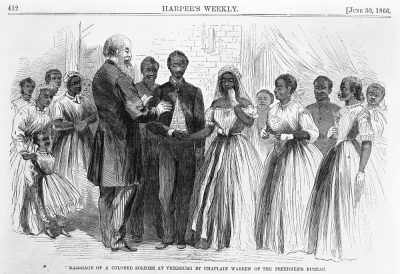 Digital records from 19th Century give Black families a glimpse of their ancestry. By Curtis Bunn / NBC News
Digital records from 19th Century give Black families a glimpse of their ancestry. By Curtis Bunn / NBC News
This month, the genealogy site Ancestry.com unveiled a Black family lineage game-changer — 3.5 million records of previously enslaved Black people, available for free.
It is believed to be the world’s largest digitized and searchable collection of Freedmen’s Bureau and Freedman’s Bank archives. The collection has Black genealogists and habitual researchers thrilled because the descendants of the enslaved in America can learn more about their families in a far easier way.
“This is very exciting and will help many researchers, historians and ordinary people trying to learn more about their ancestry,” said Angela Dodson, CEO of Editorsoncall, a company that provides editorial services for writers. Dodson has done extensive work on researching her own family tree. Read more
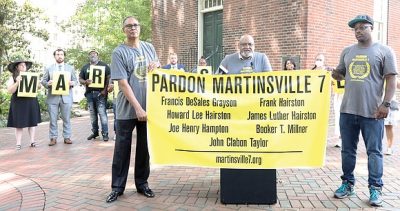 Northam was right to grant clemency to the Martinsville Seven. He should extend it to the living, too. By Molly Gill / Wash Post
Northam was right to grant clemency to the Martinsville Seven. He should extend it to the living, too. By Molly Gill / Wash Post
“We all deserve a criminal justice system that is fair, equal and gets it right,” Northam said.
He is right, but though these posthumous pardons are laudable, the governor has only a few months left to use his pardon power to correct injustices for people who are still alive and serving unfair sentences in Virginia state prisons. Read more
 Alabama Begins Removing Racist Language From Its Constitution. /NYT
Alabama Begins Removing Racist Language From Its Constitution. /NYT
The last time Alabama politicians rewrote their state Constitution, back in 1901, their aspirations were explicitly racist: “to establish white supremacy in this state.”
“The new Constitution eliminates the ignorant Negro vote and places the control of our government where God Almighty intended it should be — with the Anglo-Saxon race,” John Knox, the president of the constitutional convention, said in a speech encouraging voters to ratify the document that year.
One hundred twenty years later, the Jim Crow-era laws that disenfranchised Black voters and enforced segregation across Alabama are gone, but the offensive language written into the state Constitution remains. Now, as communities across the South reconsider racist symbols and statues, activists in Alabama who have labored for 20 years to convince voters that rewriting their Constitution is important — and long overdue — see an opportunity to get it done. Read more
 Pauli Murray Should Be a Household Name. A New Film Shows Why.
Pauli Murray Should Be a Household Name. A New Film Shows Why.
When the lawyer, activist, author and educator Pauli Murray died in 1985 at the age of 75, no obituary or commemoration could contain all of her pathbreaking accomplishments. A radical and brilliant legal strategist, Murray was named a deputy attorney general in California — the first Black person in that office — in 1946, just a year after passing the bar there. Murray was an organizer of sit-ins and participated in bus protests as far back as the 1940s, and co-founded the National Organization for Women. Murray was also the first Black woman to be ordained an Episcopal priest. In 2012, she was sainted. Read more
 The Rich History of Black Westerns Enters a New Era.
The Rich History of Black Westerns Enters a New Era.
The upcoming Netflix western “The Harder They Fall” chronicles a blood feud between the Nat Love Gang and the Rufus Buck Gang. As in many westerns, the dueling outlaws hold deep grudges. They live outside polite society. They shoot first and occasionally get around to asking questions.
They’re also all Black, a fact that goes unmentioned throughout the course of the film. “The Harder They Fall,” directed by Jeymes Samuel and starring an impressive lineup of stars, doesn’t use race as a means of social commentary, as many Black westerns have. Its radical gambit lies in reminding us there were Black outlaws and lawmen, even if they’ve often been given short shrift by the genre. The film makes its point through this brazen matter-of-factness. Shown is Danielle Deadwyler, left, Jonathan Majors and Zazie Beetz in “The Harder They Fall.” Read more
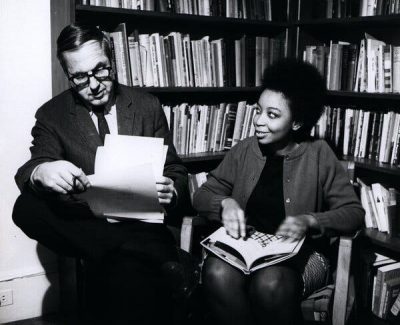 She Changed Black Literature Forever. Then She Disappeared. By Imani Perry / NYT
She Changed Black Literature Forever. Then She Disappeared. By Imani Perry / NYT
In search of Gayl Jones, whose new novel breaks 22 years of silence.
I knew from the beginning that I would not meet Gayl Jones. Or see a recent photograph of her. Or ask her any questions. What does it feel like, 46 years after the first, to have a new novel coming out? Why did you step out of view? Did it make you a more honest writer? Did it serve your soul? I would not get answers. I would not be able to charm her into laughter. I know she is brilliant, obscure, irascible. I imagine her smile is still wry. But does she still wear her head wrapped in 2021? Is she still adept at putting a nosy questioner in her place? Read more
 ‘Buena Vista Social Club’ at 25: Memories of Memories. Isabelia Herrera, Jon Pareles and
‘Buena Vista Social Club’ at 25: Memories of Memories. Isabelia Herrera, Jon Pareles and
“Buena Vista Social Club,” which was recorded 25 years ago and released in 1997, was the unlikeliest of blockbusters: a collection of decades-old Cuban songs, featuring musicians in their 60s, 70s and 80s, that has now sold in the millions worldwide.
The album was named after a long-defunct club in Havana where Black musicians had once gathered. With its release, Buena Vista Social Club also served as the name of the collective of musicians who performed on the album and, later, became an imprimatur for all sorts of projects connected to them. Shown is t Read more
 Meet the soul serenaders of September: Otis Redding, Barry White, Brook Benton, and Ray Charles. By Denise Oliver Velez / Daily Kos
Meet the soul serenaders of September: Otis Redding, Barry White, Brook Benton, and Ray Charles. By Denise Oliver Velez / Daily Kos
There must have been something in the air in September: It’s a month that gifted the world with a stellar group of Black R&B crooners. As the headline promises, four of my all-time favorites were born this month, and though they have all left this mortal plane, their music continues to entrance new generations of listeners.
This #BlackMusicSunday, let’s celebrate the lives of Otis Redding, Barry White, Brook Benton, and Ray Charles, as we take a listen to four soul brothers who sold millions of records, garnered major awards, and still have fans around the globe. Read more
 Cynthia Erivo, up for an Emmy for playing Aretha Franklin, releases a stellar debut album. By Melissa Ruggieri / USA Today
Cynthia Erivo, up for an Emmy for playing Aretha Franklin, releases a stellar debut album. By Melissa Ruggieri / USA Today
Considering the week she’s having – the debut of her solo album on Friday and attending the Emmy Awards on Sunday, where she’s nominated for her visceral portrayal of Aretha Franklin – Ervio needs to be in top form.
She plans to attend the awards (“I’m excited!” she says) and feels a kinship with Jennifer Hudson, who also depicts Franklin in the film “Respect.”
“Aretha had a tough life and you go through it as you’re playing her,” Erivo says. “I commend Jennifer for the work she did because I know it wasn’t easy.” Read more
 We’re not calling out Nicki Minaj. We’re calling her in. By Oni Blackstock and Uché Blackstock / Wash Post
We’re not calling out Nicki Minaj. We’re calling her in. By Oni Blackstock and Uché Blackstock / Wash Post
We’re not writing to call out Nicki Minaj. We’re calling her in.
The superstar rapper on Tuesday tweeted a dubious third-hand story about the coronavirus vaccine. Her cousin’s friend in Trinidad, she said, had developed a concerning fertility-related side effect after receiving the shot: “His friend was weeks away from getting married, now the girl called off the wedding.” The tweet exploded, even prompting the White House to offer to discuss the vaccine with her over the phone. Read more
 Lill Nas X’s “Montero” Is Sturdy and Sincere Pop. By Spencer Kornhaber / The Atlantic
Lill Nas X’s “Montero” Is Sturdy and Sincere Pop. By Spencer Kornhaber / The Atlantic
One of the great mysteries of our lifetime is how the banjo loop and fake drawl of Lil Nas X’s “Old Town Road” blew up into one of the biggest hits ever. The common explanations for its popularity just don’t suffice. Yes, Montero Lamar Hill is a marketing genius and meme master, but jokes alone don’t get auditoriums of children to sing your song. Yes, he linked up country and rap, but other artists blend genres all the time without scoring the longest-running No. 1 Billboard Hot 100 single in history. Read more
 After Shuttering for Almost Two Years, the Village Vanguard Reopens to Live Audiences. By Daniel King / Mother Jones
After Shuttering for Almost Two Years, the Village Vanguard Reopens to Live Audiences. By Daniel King / Mother Jones
The epicenter of jazz history in New York City, and an engine of its future, is up and running again. The Village Vanguard seated a live audience last night for the first time since the pandemic started, welcoming listeners with proof of COVID vaccination.
The historical meaning of the club’s return was marked on its website in a note pointing out that the venue had bounced back similarly in 1947 after 6 million New Yorkers were vaccinated against smallpox in less than a month. The Vanguard hosted a band that year that played the uptempo “Don’t Wait, Gate—Let’s Vaccinate,” an improvisation that, as Billboard reported that spring, “aided the city’s inoculation drive.” Read more
 Separate But Not Equal: Racial Bias In Salon Culture. By Jill Di Donato / HuffPost
Separate But Not Equal: Racial Bias In Salon Culture. By Jill Di Donato / HuffPost
Salon segregation is a dirty secret no one talks about, and unless you’ve experienced it, you might not know it exists.
Although the beauty industry professes inclusiveness, stylists aren’t being trained in all hair types, including textured hair common among Black women. As a result, Black women cannot be expertly serviced in all salons. This is problematic, especially as the salon is a place dedicated to self-care, a place to be pampered and feel beautiful. Read more
Sports
 Young People Take Center Court in ‘The Kaepernick Effect. ’ By Jesse Hagopian / The Progressive
Young People Take Center Court in ‘The Kaepernick Effect. ’ By Jesse Hagopian / The Progressive
Five years ago this month, on September 1, 2016, Colin Kaepernick went down on bended knee during the national anthem before a game between his San Francisco 49ers and the Los Angeles Chargers to protest police violence and institutional racism. Dave Zirin’s newest book, The Kaepernick Effect: Taking a Knee, Changing the World, is a collection of compelling stories that put the reader at the center of the tumultuous, frightening, and stirring protests for racial justice that, when put together, reveal the ways taking a knee transformed sports and the broader society. Read more
 Deion Sanders good option for Florida State to replace Mike Norvell. By Erik Hall / USA Today
Deion Sanders good option for Florida State to replace Mike Norvell. By Erik Hall / USA Today
ESPN football analyst Booger McFarland says Deion Sanders coaching Florida State is “inevitable” at some point after the Seminoles’ 0-2 start under Mike Norvell. Sanders has led Jackson State to a 2-0 record heading into Saturday’s game against Louisiana-Monroe.
“Doesn’t it almost feel like Florida State and Deion Sanders are on a collision course?” McFarland said on “The ESPN College Football Podcast” with Kevin Negandhi on Wednesday. “Exactly!” Negandhi said. Read more
 “The Most Beloved Man on the Planet”: Ken Burns on Muhammad Ali. By Michael Tomasky / TNR
“The Most Beloved Man on the Planet”: Ken Burns on Muhammad Ali. By Michael Tomasky / TNR
Ken Burns, the celebrated documentarian whose films have chronicled America’s story from jazz to baseball to war, is out with his and his team’s newest work, a four-part documentary about the life of Muhammad Ali. The film, called simply Muhammad Ali and produced by Burns, daughter Sarah Burns, and David McMahon, tells Ali’s full life story, from his Louisville, Kentucky, childhood to his final years, with incredible footage and an array of talking heads—boxing writers, political journalists, poets—that reflects the breadth of Ali’s impact on the world. The series debuts this Sunday, September 19, on PBS (check local listing). TNR editor Michael Tomasky spoke with Burns earlier this month. Read more
Site Information
Visit our home page for more articles, book/podcast and video favorites. And at the top of this page register your email to receive notification of new editions of Race Inquiry Digest. Click here for earlier Digests.
About Race Inquiry and Race Inquiry Digest. The Digest is published on Mondays and Thursdays.
Use the buttons below to share the Digest in an email, or post to your Facebook, Linkedin or Twitter accounts.